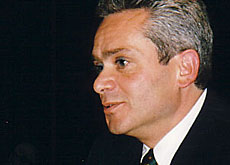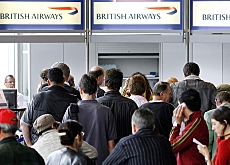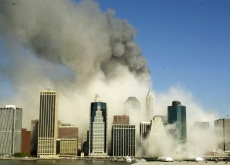Expert stresses limits of anti-terror fight

Former Swiss spy and terrorism expert Jacques Baud tells swissinfo why using security measures to fight against terror can sometimes be a losing battle.
Baud also underlined that last week’s foiled airline attack in London did not mark any change in the nature of the terrorist threat.
The discovery of an alleged bomb plot to blow up United States-bound planes has once again put the spotlight on terrorism.
Heightened security measures have since been enforced at airports around the world, including at Switzerland’s main air hubs, Geneva and Zurich.
Experts say the failed attacks would have involved liquid explosives made with widely available ingredients.
Baud is the author of several works on terrorism, including the book, The Asymmetric War.
swissinfo: Experts say that ingredients for liquid explosives can be bought in shops and the explanations on how to use them found on the internet. Is the nature of terrorist acts changing?
Jacques Baud: In fact, “recipes” for making explosives from widely available products have been around for several decades in specialised literature on the subject. Explosive mixtures can be made from aspirin, urine, cocoa powder and household bleach.
The London plot does not mark therefore any change in the nature of the terrorist threat.
swissinfo: Can Switzerland continue to ensure its internal security in the same way?
J.B.: I suppose these “recipes” or at least the threat that they represent were and are known by our police forces.
Nevertheless, they illustrate how difficult it is to establish control over everything that could be part of a terrorist threat. How can one control the sale and use of icing sugar and parts used in plumbing? It’s virtually impossible.
swissinfo: Is a pure security approach enough to face up to this type of threat?
J.B.: Actually, the security approach is the worst way to resolve the terrorism question because security always follows on from terrorist intent.
The problem is that a more anticipatory approach necessitates a real understanding of the motivations behind the terrorists and this is far from being the case. Too often “trying to understand” is seen as “accepting”.
Nevertheless, it should be noted that certain decisions – like the one to attack Iraq for example – have created a “cause” for Islamic militants and have generated more terrorism.
Getting rid of terrorists doesn’t necessarily mean getting rid of terrorism. It is often the case that getting rid of terrorists or certain networks encourages the appearance of new terrorists and networks which are more difficult to identify.
swissinfo: The actions of al-Qaeda have been described as asymmetric warfare, a type of conflict that also can be seen in Iraq, the occupied Palestinian territories and in Lebanon. Are these different conflicts actually of the same type?
J.B.: The principle of asymmetric warfare, as I have defined in my books, is not to take advantage of one’s superiority, but to transform the superiority of an adversary into a weakness.
This is, for example, the case for Hezbollah in Lebanon and Hamas in the occupied territories who have financed the rehousing of families and the reconstruction of houses destroyed by Israel following the discovery of [an alleged] terrorist.
Thanks to these mutual aid structures, Hezbollah and Hamas have therefore “won over” politically the families concerned.
Another aspect of asymmetric warfare is that, in the Islamic world, the notion of victory is more associated with the ability to resist rather than with that of destroying your adversary.
This explains why – as Walid Jumblat, the Druze community leader in Lebanon, said several weeks ago – Hezbollah has already won its war… even if southern Lebanon is destroyed.
swissinfo-interview: Frédéric Burnand in Geneva
The last internal security report, published in May by the Federal Police Office, underlined how Europe and Switzerland have become operational bases for Islamic militant groups with possible links to al-Qaeda.
In June 2006, the Swiss Federal Prosecutor’s office confirmed the arrest of several members of a suspected terrorist cell which was planning an attack in Switzerland against an Israeli aircraft.
In August 2004, Mohamed Achraf was arrested at Zurich airport before being extradited to Spain. He is suspected of plotting to blow up the National Court in Madrid.
Security checks for flights to the United States have been stepped up at Swiss airports since Monday.
Apart from a ban on taking liquids or gels onto the plane, hand luggage and body searches are now obligatory for all passengers to the US.
The cafes and bars behind airport security at Zurich airport have been closed for passengers going to the US since Tuesday. Geneva airport is exempt from this.

In compliance with the JTI standards
More: SWI swissinfo.ch certified by the Journalism Trust Initiative




You can find an overview of ongoing debates with our journalists here . Please join us!
If you want to start a conversation about a topic raised in this article or want to report factual errors, email us at english@swissinfo.ch.